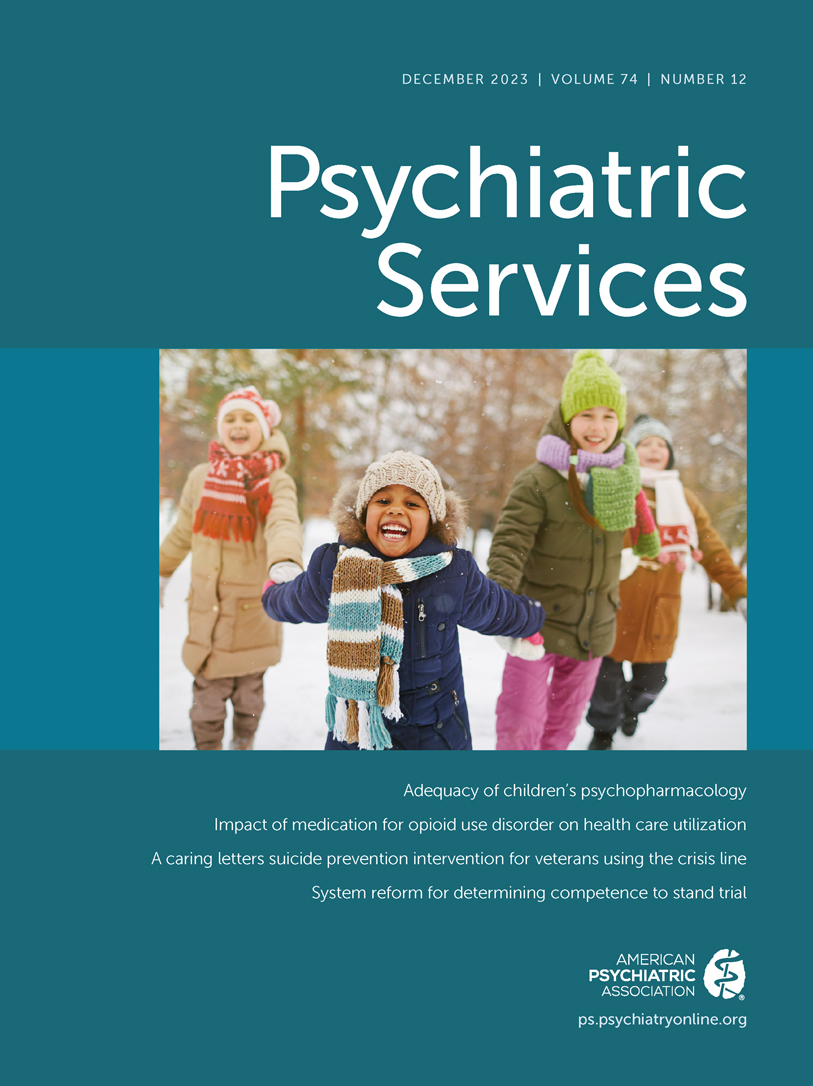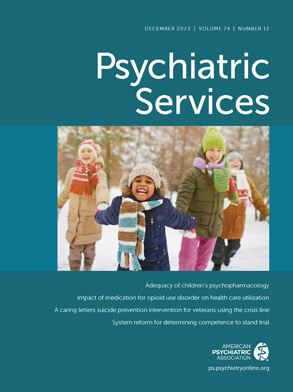Trauma and Trauma-Informed Care in Early Intervention in Psychosis: State of Implementation and Provider Views on Challenges
Abstract
Objective:
Methods:
Results:
Conclusions:
HIGHLIGHTS
Methods
Study Design
Participants
Survey Items and Measures
Analysis of Close-Ended Questions
Analysis of Open-Ended Questions
Results
Sample
| Variable | N | % |
|---|---|---|
| Affiliation or treatment model | ||
| OnTrackNY | 44 | 27 |
| NAVIGATE | 18 | 11 |
| Early Psychosis Prevention and Intervention Centre | 21 | 13 |
| Early Assessment and Support Alliance | 8 | 5 |
| Ohio Best Practice for Schizophrenia Treatment | 8 | 5 |
| Open Dialogue | 4 | 2 |
| U.K. National Health Service | 31 | 19 |
| Montreal Early Psychosis Intervention | 3 | 2 |
| Ontario Early Psychosis Intervention | 8 | 5 |
| Yale Specialized Treatment Early in Psychosis | 2 | 1 |
| Massachusetts Department of Health’s Prevention & Recovery in Early Psychosis | 3 | 2 |
| California Family Services Agency/Felton | 3 | 2 |
| Blended or hybrid model | 11 | 7 |
| Role | ||
| Therapist or psychologist | 42 | 26 |
| Psychiatrist or nurse practitioner (medication prescribers) | 24 | 15 |
| Case managers (including nurse case managers and vocational support staff) | 29 | 18 |
| Directors and team supervisors | 54 | 33 |
| Peer workers | 8 | 5 |
| Research or evaluation staff | 7 | 4 |
| Race-ethnicity | ||
| Hispanic/Latinx | 20 | 12 |
| East Asian | 3 | 2 |
| South Asian | 3 | 2 |
| Southeast Asian | 2 | 1 |
| African American/Black | 7 | 4 |
| Caucasian/White | 122 | 74 |
| Middle Eastern | 1 | 1 |
| Multiracial | 6 | 4 |
| Female gender | 107 | 65 |
| Highest level of education | ||
| Secondary school | 1 | 1 |
| Some college | 3 | 2 |
| Bachelor’s degree | 27 | 16 |
| Master’s degree | 85 | 52 |
| Doctorate (Ph.D., M.D., or Psy.D.) | 48 | 29 |
| Age (M±SD years) | 41.7±10.2 |
Close-Ended Items
Trauma and etiology.
| Not a factor | Moderate factor | Major factor | |||||
|---|---|---|---|---|---|---|---|
| Factor | Total N | N | % | N | % | N | % |
| Neurochemistry or brain-based problems or dysfunction | 133 | 6 | 5 | 46 | 35 | 81 | 61 |
| Genetics or epigenetics | 132 | 6 | 5 | 63 | 48 | 63 | 48 |
| Sensitivity to psychosocial stress | 131 | 3 | 2 | 51 | 39 | 77 | 59 |
| Individual trauma (e.g., sexual abuse, bullying) | 132 | 2 | 2 | 57 | 43 | 73 | 55 |
| Background adversity (e.g., poverty, living in a dangerous neighborhood) | 132 | 10 | 8 | 69 | 52 | 53 | 40 |
Trauma assessment and training.
| Program features | N | % |
|---|---|---|
| Formal assessment of trauma | 43 | 39 |
| Targeted training on trauma in the context of early psychosis | 38 | 35 |
| Training on trauma in general, not specific to psychosis | 42 | 38 |
| Capacity to provide trauma-focused interventions | 56 | 51 |
| Has made changes or adaptations to trauma-related policies since trauma-informed care started | 35 | 32 |
| Refers clients outside (to external programs) for trauma-related concerns | 61 | 56 |
| Has formal policies concerning trauma-informed care | 46 | 42 |
Exclusion criteria.
Perceived personal and team capacities to provide trauma-focused or trauma-informed care.
| Itema | Score (M±SD) |
|---|---|
| Providers in [my] program often struggle to figure out how to work with traumatic experiences. | 4.4±1.6 |
| Supervisors are generally knowledgeable about the ways in which trauma impacts on psychosis. | 4.4±1.6 |
| Staff consistently make efforts to integrate trauma-informed techniques into the treatment of clients with an identified trauma history. | 5.2±1.4 |
| I believe that, in general, the field of early intervention should be allocating more resources to the clinical intersections of trauma and psychosis. | 4.6±1.3 |
| I personally feel like I would benefit from more training or guidance specific to working with trauma in the context of early psychosis. | 6.2±1.1 |
EIP Providers’ Concerns About Unmet Trauma-Related Needs
Trauma has come up with a variety of our clients [but] with no structured policy in place. We have been urged to read about trauma in the population but without any clear treatment guidance. It often feels as if we are ignoring trauma until we cannot anymore.[There are] insufficient protocols and treatment. Further, there are no clear indicators or tools which would indicate focusing on trauma versus [FEP] modules embedded in such programs as NAVIGATE [a manualized EIP model].
There hasn’t been enough done to help clinicians differentiate the impact of complex trauma symptoms from psychotic symptoms.My view is that most of the clinicians do not have the appropriate training and do not want to cause more harm by not doing it “properly.” We tend to refer to other agencies, but we tend to lose clients that way as well. They would prefer to have all their needs addressed with the EPI [early psychosis intervention] program. I feel like we view trauma as a separate thing, but I think that it is more like concurrent disorders now, where you have to treat the addiction and mental health problem at the same time. We should be equipped to deal with trauma and psychosis at the same time.I think that the connections between trauma and psychosis are incredibly deep and that the divide between the two means that people are often understood through one lens or another depending on the orientation/perspective of the clinician rather than the reality of the experience of the individual.
One key barrier in meeting the needs of clients with trauma histories has to do with the nature of clinical assessments and the diagnostic criteria of EIP programs, because these factors rely on [a] false divide between the two and often force a conceptualization that relies on either trauma or psychosis as if the two could be meaningfully separated.
In the program where I worked, we would have to assign psychotic spectrum diagnoses in order to be able to offer services, and at times this meant that the role of trauma was placed in the background in a way that was inaccurate to the reality of the person’s experience.
In terms of training, we were trained in CBTp and consistently asked for more specific training around trauma but were never provided it. I saw this as an enormous shortcoming in the training program that reflected a profound misunderstanding of the nature of the problems we were trying to address.I continue to be surprised and astounded by the way trauma and psychosis can interact and manifest [as] an unexpected change in presentation. I feel limited by my lack of training. I feel that if psychotic symptoms begin to clear and it is evident that PTSD or dissociation disorders are underlying [other symptoms], it seems that the groups and activities we have may not really meet the needs of the client.
[For trauma-focused intervention development], [t]he field needs an evidence-based approach for treating trauma in the context of psychosis. That might include trauma resulting from a psychotic episode, psychotic symptoms apparently triggered by a traumatic event, or coexisting symptoms of psychosis and trauma. As far as I understand, no such treatment exists.[To address structural and community disadvantage], [t]here is a need for more community psychology–level interventions that support people living in deprived areas. There is too much emphasis on individual therapy interventions, even within [early intervention programs], which [are] more inclusive of family and systems [than of] a number of other areas.[In regard to trauma training], I think calling more attention to the need for trauma-integrated care is necessary. Educating clinicians on the ways in which trauma is likely impacting their case conceptualizations and subsequent treatment response[s] may help to call more attention to this issue.
Discussion
Conclusions
Supplementary Material
- View/Download
- 73.28 KB
References
Information & Authors
Information
Published In
History
Keywords
Authors
Competing Interests
Funding Information
Metrics & Citations
Metrics
Citations
Export Citations
If you have the appropriate software installed, you can download article citation data to the citation manager of your choice. Simply select your manager software from the list below and click Download.
For more information or tips please see 'Downloading to a citation manager' in the Help menu.
View Options
View options
PDF/EPUB
View PDF/EPUBLogin options
Already a subscriber? Access your subscription through your login credentials or your institution for full access to this article.
Personal login Institutional Login Open Athens loginNot a subscriber?
PsychiatryOnline subscription options offer access to the DSM-5-TR® library, books, journals, CME, and patient resources. This all-in-one virtual library provides psychiatrists and mental health professionals with key resources for diagnosis, treatment, research, and professional development.
Need more help? PsychiatryOnline Customer Service may be reached by emailing [email protected] or by calling 800-368-5777 (in the U.S.) or 703-907-7322 (outside the U.S.).

